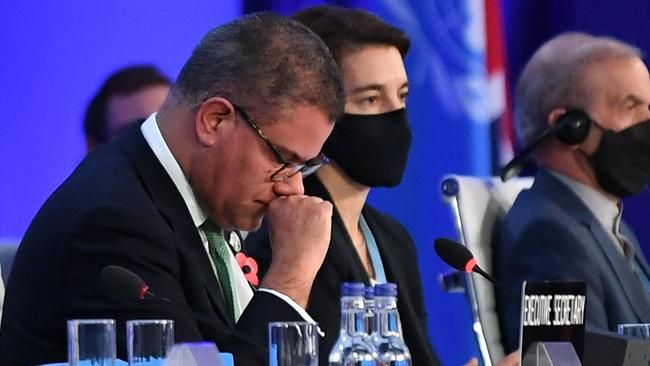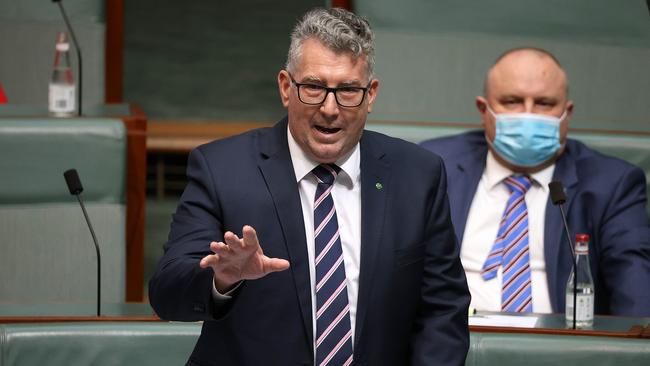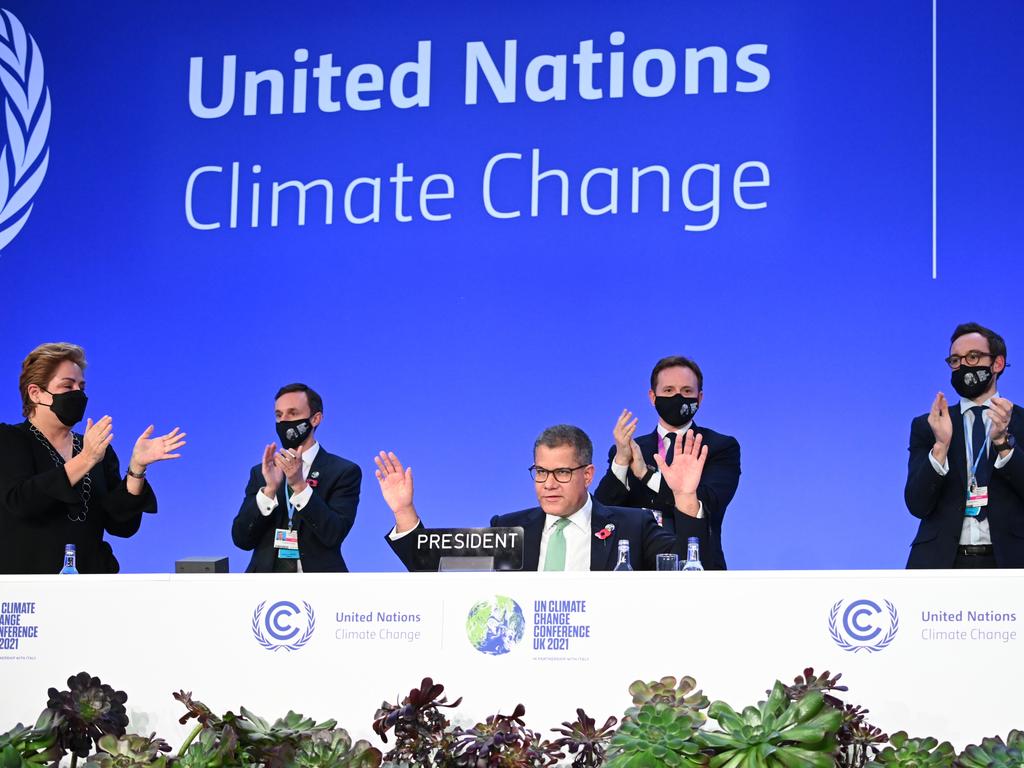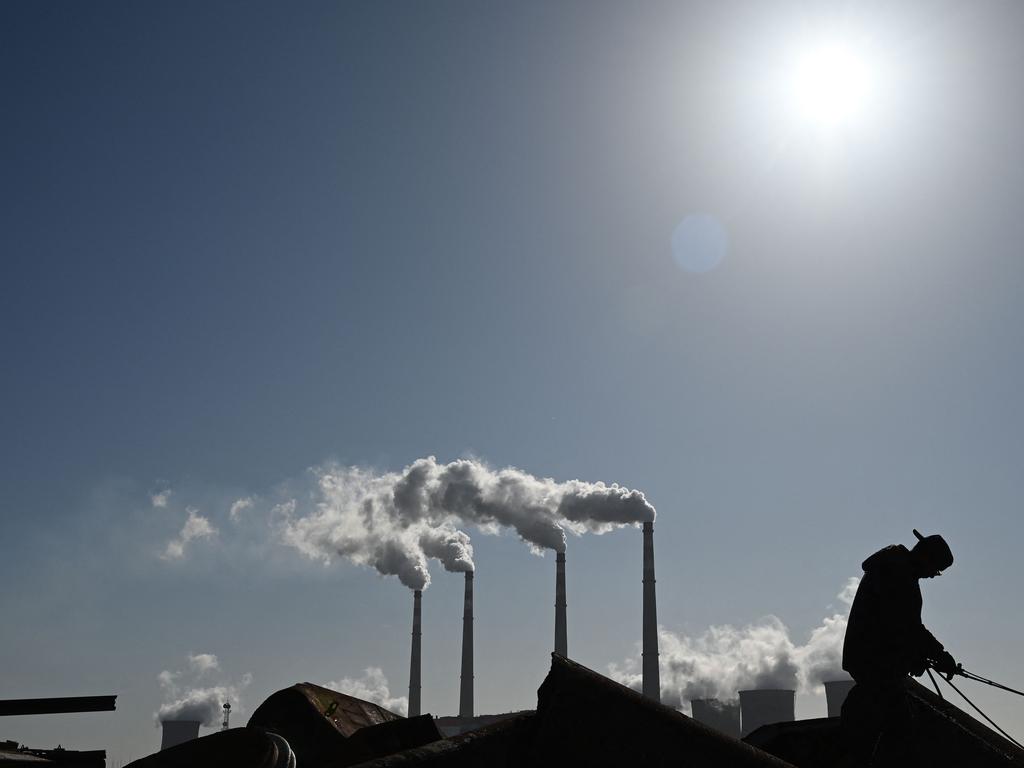Big switch: coal is phased down but not out after COP26
A retreat over the phase-out of coal at the Glasgow climate summit is an economic win for Australia, Resources Minister Keith Pitt says.

A retreat over the phase-out of coal at the Glasgow climate summit has been endorsed as an economic win for Australia by Resources Minister Keith Pitt, with the government rejecting the agreement’s request to increase its 2030 emissions reduction targets by the end of next year.
Mr Pitt, who was returned to cabinet to bolster the Nationals’ numbers in return for supporting Scott Morrison’s 2050 net-zero target, said the decision to remove the “phase-out” of coal from the text of the Glasgow Climate Pact meant no Australian mines would have to close and coal would remain a key export for years.
“Once again, this supports Australia’s position in terms of, firstly, our commitment (on climate change) but secondly our commitment to the resources sector that we won’t be closing mines and closing coal-fired power stations,” he told The Australian.
“Markets will determine the opportunities for Australia’s coal, and right now those opportunities are strong and we expect that to continue into the future.”
Australia was not part of the 11th-hour intervention from India and China at the Glasgow summit, which saw the “phase-out” of coal changed to “phase-down” in a move that left COP26 president Alok Sharma on the verge of tears and hesitant to bang the gavel to declare the pact accepted.

“I apologise for the way this process has unfolded. I am deeply sorry,’’ he told delegates.
The agreement, accepted by 196 nations, keeps alive the goal of limiting global temperature increases to 1.5C above pre-industrial levels, but Mr Sharma conceded its “pulse is weak.”
“It will only survive if we keep our promises,” he said. “If we translate commitments into rapid action. If we deliver on the expectations set out in this Glasgow Climate Pact to increase ambition to 2030 and beyond.”
UN secretary-general Antonio Guterres warned the world: “We are still knocking on the door of climate catastrophe. Our fragile planet is hanging by a thread.”
Based on pledges made by nations at COP26, a range of estimates has put a projected increase to global temperatures at somewhere between 1.8C and 2.4C – well above the 1.5C threshold.
The agreement is the first to reference coal in a COP text but the “phase-down” pledge falls short of the goal of “consigning coal to history” that British Prime Minister Boris Johnson was hoping to achieve.
However, the climate pact did fast-track the timeline for scaling up climate action by requesting that nations “strengthen the 2030 targets in their nationally determined contributions ... by the end of 2022.” Under the Paris Agreement, parties were expected to update their plans every five years.
Energy Minister Angus Taylor told The Australian the government would not update its target to reduce emissions by 26-28 per cent, which would remain “fixed” although Australia would continue to submit updated emissions reduction projections as part of the UN process.
“We have set our target,” Mr Taylor said. “We don’t reset our targets. We update our projections every year and they have always showed improvements.”
Opposition climate change spokesman Chris Bowen blasted the Coalition for its refusal to comply with the agreement. “The Morrison government agreed to an international pact, and the same day confirms they have no intention to fulfil it,” he told The Australian.
“Mr Morrison’s untrustworthiness is undermining Australia’s reputation and interests.”
The Investor Group on Climate Change also took aim at the decision, saying the consequence would be a “capital flight out of Australia to countries with more ambitious targets and policies”.
“This is not just a signal to governments, it’s a signal to global capital markets,” said IGCC policy director Erwin Jackson.
Anthony Albanese said the obligation on Australia to “sign up to a higher target in 2022 for 2030 is something that the Prime Minister must explain” saying the existing target was inadequate. “Why is it we went to the Glasgow conference with Tony Abbott’s target in 2015?” the Opposition Leader said.
While the response from international delegates in the Glasgow conference room was sombre, much of the reaction to the climate pact from outside Glasgow was heavily critical.
Amnesty International said leaders had “catastrophically betrayed humanity at large by failing to protect people most affected by the climate crisis and instead caving into the interests of fossil fuel and other powerful corporations”.
Oxfam International executive director Gabriela Bucher said “some world leaders think they aren’t living on the same planet as the rest of us”.
Friends of the Earth climate campaigner Rachel Kennerley, said the road to 1.5C had just got harder and Australian Conservation Foundation climate program manager Gavan McFadzean said there had been some breakthroughs but none involved Australia
The Glasgow Climate Pact urged developed nations to double their contributions to developing nations fighting climate change and allowed for poorer nations hit by extreme weather events to be compensated.
However, plans to offer reparations to countries for the damage caused by richer nations were put on the back burner.
An agreement was reached on the fundamental process of carbon markets, which will make the Paris Agreement fully operational, and there was a deal struck over the proper format to account for targets and emissions, something for which Australia had strongly lobbied.
Mr Taylor and Foreign Minister Marise Payne said the breakthrough on transparency was the “key to accountability and to translating ambition into achievement”.
“This goes to the heart of the Paris Agreement, which relies on all countries delivering on their commitments to achieve a global net-zero outcome. Australia’s emissions reporting and transparency is the gold standard and we expect all major emitters to display similar levels of transparency,” they said.
Nationals senator Matt Canavan, who has vowed to campaign against the 2050 net-zero target at the election, said the government should “redo its modelling based on the fact coal exports are not going to decline”.
“India and other countries will continue to use our coal and we should support the growth of Australia’s high quality coal so we can support our allies in their development goals.
“I am disappointed we have largely left it up to countries like India to inject common sense,” he said. “India should be able to grow and develop just like every other rich country has over the past two centuries.”
The removal of the phase-out of coal created anger among many nations at the conference. Mexico was furious at the “non-transparent and non-inclusive process” and Fiji expressed “astonishment and immense disappointment,’’ saying countries could exploit loopholes and the phase-down had no demonstrable measurements.
US climate envoy John Kerry said the wording on coal could be adjusted at the next COP and coal had to be phased down before it could be phased out, so it was, he believed, a big diplomatic win.







To join the conversation, please log in. Don't have an account? Register
Join the conversation, you are commenting as Logout